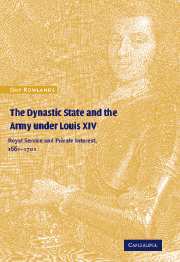Book contents
- Frontmatter
- Contents
- List of maps
- Acknowledgements
- List of abbreviations
- Family tree of the Le Tellier: 1. Principal branch
- Family tree of the Le Tellier: 2. Royal household marital connections
- Map 1 The French provinces under Louis XIV
- General introduction: ‘Absolute monarchy’, dynasticism and the standing army
- Part I ‘Patrimonial bureaucracy’: The Le Tellier dynasty and the Ministry of War
- Part II The forging of the French officer corps and the standing army under Louis XIV
- Introduction
- 6 In the name of sustainability: reforming the structure of the standing army and the officer corps
- 7 The business of a regiment
- 8 The pressures and temptations of service
- Part III The high command of the French armies
- Conclusion: The preservation of the dynasty
- Appendix 1 Defining the grands
- Appendix 2 The proportion of revenue generated by the Extraordinaire des Guerres as a ‘primary receiver’
- Bibliography
- Index
- CAMBRIDGE STUDIES IN EARLY MODERN HISTORY
7 - The business of a regiment
Published online by Cambridge University Press: 20 May 2010
- Frontmatter
- Contents
- List of maps
- Acknowledgements
- List of abbreviations
- Family tree of the Le Tellier: 1. Principal branch
- Family tree of the Le Tellier: 2. Royal household marital connections
- Map 1 The French provinces under Louis XIV
- General introduction: ‘Absolute monarchy’, dynasticism and the standing army
- Part I ‘Patrimonial bureaucracy’: The Le Tellier dynasty and the Ministry of War
- Part II The forging of the French officer corps and the standing army under Louis XIV
- Introduction
- 6 In the name of sustainability: reforming the structure of the standing army and the officer corps
- 7 The business of a regiment
- 8 The pressures and temptations of service
- Part III The high command of the French armies
- Conclusion: The preservation of the dynasty
- Appendix 1 Defining the grands
- Appendix 2 The proportion of revenue generated by the Extraordinaire des Guerres as a ‘primary receiver’
- Bibliography
- Index
- CAMBRIDGE STUDIES IN EARLY MODERN HISTORY
Summary
The administration of the regiments and companies of the French army was a profoundly taxing business, both for the crown and for the officers concerned. It involved nobles trying to exercise entrepreneurial talents for which they had received little training, and a civilian administration which could provide only limited guidance on how they should run their units. Nevertheless, most regiments remained in reasonably good shape throughout all but the last of Louis XIV's wars, even if king and ministers often wished they were better maintained. Much of the credit for this should be given to officers who managed to steer between the scylla of crown expectations and the charybdis of personal financial ruin. Regimental administration remained deficient from a Napoleonic perspective, but by contemporary standards the French did remarkably well after 1661 to create and sustain a standing army, which reached about 320,000 men, lest one forget, just over thirty years later – a four-fold expansion from Mazarin's day and the largest force in Europe by a factor of more than two. If Louis XIV had high expectations of his officers, he and his ministers also came to have a more sensitive and subtle appreciation of how to get the best out of them. This chapter will therefore seek to explain the way administrative procedures were altered, and how a more sophisticated system of financial support for the officers evolved during the forty-two years after the treaty of the Pyrenees.
- Type
- Chapter
- Information
- The Dynastic State and the Army under Louis XIVRoyal Service and Private Interest 1661–1701, pp. 200 - 231Publisher: Cambridge University PressPrint publication year: 2002

